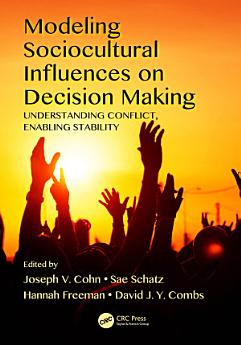Modeling Sociocultural Influences on Decision Making: Understanding Conflict, Enabling Stability
About this ebook
The chapters in this volume were contributed by leading experts from academia, industry, and government and provide:
- Insights into cross-cultural decision making based on recent international events, with grounding in an historical context
- Discussions of cutting-edge modeling techniques used today by professionals across multiple organizations and agencies
- Descriptions of specific cross-cultural decision making tools designed for use by laypeople and professionals
- Case studies on the role of cross-cultural decision making grounded in current events and (in many cases) military applications.
About the author
Joseph V. Cohn, PhD, earned his BS in biology from the University of Illinois–Urbana
Champaign in 1993. He earned his PhD in neuroscience from Brandeis University in 1998.
He has coauthored more than 100 publications and presented talks to national and international
professional conferences on a host of topics, ranging from foundational neuroscience
to the nature of technical innovation. He has coedited a three-volume book series
focusing on all aspects of training system development and a single-volume book on
enhancing human performance in high-risk environments. He has received industry and
professional society awards for his research across the spectrum of the human performance
and biomedical sciences. He cochaired the Applied Human Factors and Ergonomics
Association’s Cross-Cultural Decision Making Conference from 2013 to 2015 and is a fellow
of the American Psychological Association and the Society of Military Psychologists,
as well as an associate fellow of the Aerospace Medical Association.
Sae Schatz, PhD,
is an applied human-systems researcher, learning science professional,and cognitive scientist. She has headed an array of applied research efforts, authored more
than 50 peer-reviewed scholarly publications, led the development of three military textbooks,
and received industry awards for both her publications and her research efforts.
Schatz cochairs the Applied Human Factors and Ergonomics Association’s Cross-Cultural
Decision Making Conference (2013–), is a service principal for the Interservice/Industry
Training, Simulation and Education Conference (2015–), and supports international science
and technology working groups associated with the North Atlantic Treaty Organization,
Partnership for Peace, and The Technical Cooperation Program. Schatz also maintains
close ties with her alma mater, the University of Central Florida, where she earned her
PhD in human systems in modeling and simulation in 2008.
Hannah Freeman
earned her Bachelor of Arts degrees in international studies (Russianand Eastern European studies) and Hispanic studies from Illinois Wesleyan University,
where she was awarded Phi Beta Kappa, in 2012. Freeman earned her Master of Science
degree in comparative politics (conflict studies) from The London School of Economics
and Political Science in 2013, where she also received a Russian Language Certificate. Her
research interests include the former Soviet Union and Soviet bloc, post-Soviet Russia,
human rights, national and ethnic conflict, radicalization, political violence, and terrorism.
David J. Y. Combs, PhD,
earned his BA in psychology from Simpson University in 2003.He earned his PhD in experimental social psychology from the University of Kentucky in
2010. He has also completed certifications in political psychology (Stanford University),
analysis of incomplete data sets (University of Michigan), and Afghanistan–Pakistan
regional expertise. He has completed additional coursework (applied survey sampling)
with The George Washington University. He has coauthored dozens of papers, conference
presentations, and book chapters on social psychological topics such as trust, attitude
change, experience of humiliation, and emotions resulting from political events. He is
especially interested in applying social psychological theory and methods to understanding
cross-cultural interactions within the irregular warfare context.





